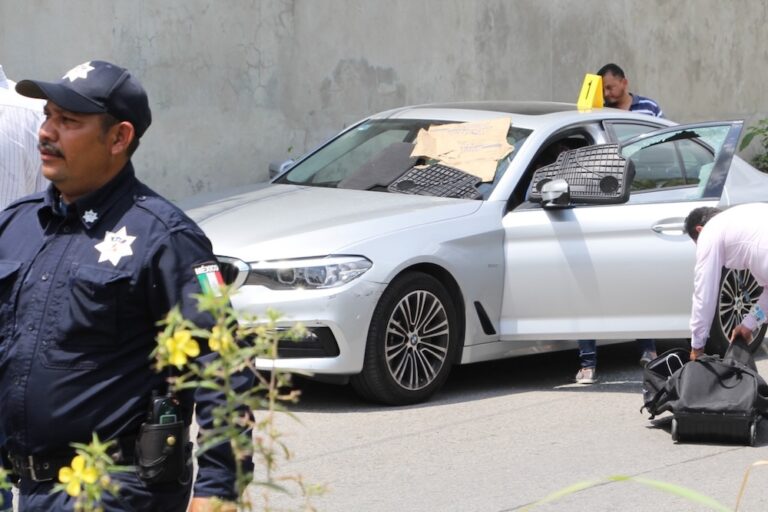(CPJ/IFEX) – In the last several months, CPJ has received a series of complaints, ranging from physical attacks to detention, from journalists working in the states of Chiapas and Guerrero, where insurgent groups are active. Following is an account of recent incidents: On 5 June 1998, photographer Pascual Gorriz of the Associated Press (AP) was […]
(CPJ/IFEX) – In the last several months, CPJ has received a series of
complaints, ranging from physical attacks to detention, from journalists
working in the states of Chiapas and Guerrero, where insurgent groups are
active. Following is an account of recent incidents:
On 5 June 1998, photographer Pascual Gorriz of the Associated Press (AP) was
confronted by a state police commander in the town of Nicolás Ruiz in
Chiapas. The commander ordered police officers to “take away his camera
(quitarle la cámara).” When the officers did not comply, the commander began
chanting “foreigner, foreigner (extranjero, extranjero)” in a clear attempt
to incite the crowd to take action. Both Gorriz and Oriana Elicabe of Agence
France Presse (AFP) were beaten at the Tuxtla Gutiérrez airport in Chiapas
on 12 April by police officers who tried to confiscate their film. The
photographers were covering the expulsion of a group of foreign human rights
observers from Mexico (see IFEX alert of 16 April 1998).
After the 7 June armed battle between the Mexican army and the members of
the Revolutionary Popular Army (EPR) in El Charco, Guerrero, in which 11
people were killed, military authorities sealed off the area to journalists
for 24 hours. Three days later, on 10 June, ten people were killed when army
troops and state police stormed the town of El Bosque in Chiapas. Soldiers
stationed outside the town allowed a handful of Mexican journalists to pass
but barred the foreign reporters, including Janet Schwartz from “Novedades”
and “Tabasco Hoy”, Jesús RamÃrez from Reuters, as well as both Gorriz and
Elicabe.
On 28 June, freelance journalist Paige Bierma was returning from Aguas
Blancas, Guerrero, where she had gone to cover Mexican university students
who had visited the town to commemorate the third anniversary of the
massacre of 17 peasants by state authorities. At a military checkpoint,
Bierma was forced off the bus and questioned by immigration authorities.
Despite showing a valid journalistâs visa, and a press pass from “Newsweek”
magazine, she was told to sign a two-page form agreeing to appear before
immigration authorities in Mexico City the following morning. Bierma refused
to sign. She did arrange a meeting in Mexico City on 30 June with
immigration authorities, who apologized for the incident.
In addition, CPJ has received a number of complaints from journalists in the
United States who have requested visas at Mexican consulates. According to
journalistsâ reports, consular officials question them about who they
planned to interview, and what they planned to write about. Often their
visas are held up for weeks or months.
A government campaign to crack down on human rights groups who engage in
“Revolutionary tourism” in Chiapas has created new difficulties and dangers
for foreign journalists. On 5 May, Darrin Wood, who writes for Nuevo
Amenecer Press, was included in a list of 163 foreigners who were denounced
in the Congress for allegedly entering Mexico through a third country with
the intention of destabilizing Chiapas. Wood, a U.S. citizen, lives in
Madrid. Nuevo Amenecer Press is an Internet-based agency that covers human
rights in Mexico. In a separate incident, the previously-mentioned Schwartz,
a Mexican photographer and “New York Times” correspondent Julia Preston were
shoved and confined for two hours in a school house by hostile villagers in
San Geronimo Tulija, Chiapas.
Recommended Action
Send appeals to authorities:
officials who
attack or threaten journalists will face prosecution under Mexican law
journalists with a proper visa (FM-3) are authorized to work in Mexico and
should not be detained
press
in conflict areas so that local communities do not misinterpret comments
made by Mexican President Ernesto Zedillo about recent restrictions placed
on non-Mexican human rights observers as a licence to attack foreign
journalists.
Appeals To
His Excellency Ernesto Zedillo Ponce de Leon
President of the Republic of Mexico
Los Pinos
Mexico City
Fax: +52515 17 94/ 542 1648
Please copy appeals to the source if possible.


